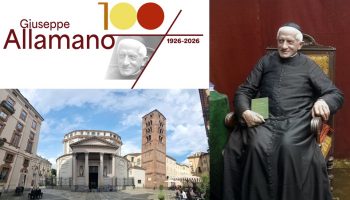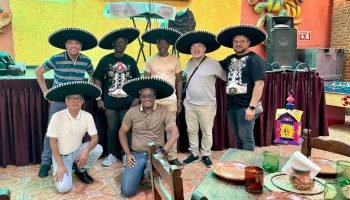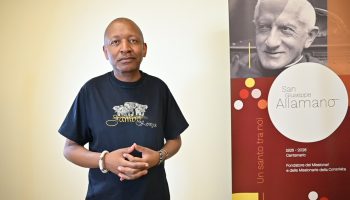
The ongoing course for formators addresses various topics. “Formed in the Charism of the Consolata Missionary Institute” was the topic presented by Father Nicholas Muthoka, IMC, on the afternoon of Thursday, September 5. Thirteen formators are taking part in the course that will be staged in Rome from September 2 to 17.
By Martin Serna *
Father Nicholas a Kenyan Consolata Missionary, ordained in 2011, has a degree in pastoral theology. He worked as a missionary animator in the diocese of Turin. Since 2013 he has lived and worked in the parish of “Maria Speranza Nostra”, in the historic neighborhood of Barriera di Milano, the most multi-ethnic in the city of Turin; first as assistant parish priest and then as parish priest from November 2017 up to now. Furthermore, he is a member of the formation team of the Apostolic Formative Community (CAF) together with Father Samuel Kabiru and its five professed students.
“Formation and mission must go hand in hand, in fact, we form seminarians for the mission,” says Nicholas. In this video, produced by the Communication Secretariat, the missionary presents a summary of the presentation done for the formators in Rome.
According to Father Nicholas, “the formation process must help us fall in love with the mission, and in this way, prepare the future of the Church. The Lord has chosen us as formators and we are the ones who must make the young men in formation fall in love with the mission. Therefore, we must reflect on various elements required to help a young man who desires to be a Consolata missionary”:
We are used to being “multitasking” missionaries: psychologists, nurses, doormen who receive people, plumbers who fix the house, etc. We must learn first and formost to be animators, avoiding clericalism and overloading ourselves by doing many things at the same time.
Identified formators: passionate, consistent with our charisma and full of zeal.
Humility of the seminarians: experiencing a formation linked to the mission, forming the young men for a very demanding mission. This is because well-formed seminarians are the treasure of the church.
Preparing for the mission ad gentes requires strong people. “If the seminarians are active, they will also be when they are priests, on the contrary if they careless, impatient, aggressive, untouchable, they will also be like this in the future as priests.

Post-modern culture: Today there is a cultural confusion that is important to know. We come out of our villages to study in the big cities and do not assimilate well the culture in which we live. Father Nicholas invites to study the culture in which we live and have a critical approach to it; “because our students are already very much influenced by post-modern culture. All of this requires an interior change, they experience a reality that does not touch them, with the tendency to return to their land of origin”.
On a personal level: there is great fragility on a human level, they live a fragmented family experience, they experience traumas whose wounds do not heal for long time. All this leads to the difficulty of accepting oneself and building positive relationships with others. This culture of consumerism and individualism makes religious life perceived as a path out of precariousness and of comfort, and all this can lead to a easy passive life, to a minimal commitment in pastoral ministry, and lack of missionary zeal.

Alcuni spunti per cercare delle soluzioni
– fare una lettura critica della cultura contemporanea che aiuti i missionari.
– studiare e approfondire con i ragazzi in formazione tutto quanto si riferisce alla cultura, perché non potranno fare un vero annuncio quando non c’è chiarezza.
– avere una forte spiritualità.
– non sottovalutare le ferite, facendosi aiutare delle scienze umane per lavorare sulla personalità dei candidati.
Some ideas in search of solutions
– to make a critical reading of contemporary culture that may help the missionaries.
– to study and deepen with the young men in formation everything that refers to culture, in fact they will not be able to cleary announce the Gospel when there is no clarity in themselves.
– to have a deep spirituality.
– do not underestimate the emotional wounds. Human sciences should help in healing those wounds and assessing the personality of the candidates.

After Father Nicholas’s speech, the 13 formators taking part in the course held a group work session guided by the following questions:
1. What am I doing as a formator to elicit the culture of the seminarians?
2. In my work as a formator, how do I try to understand and live the context where the formative community is located?
The outcome of the group work was shared in the plenary session with time for some final reflections.
* Father Martin Serna, IMC, Novice Master in Manaus, Brazil.




